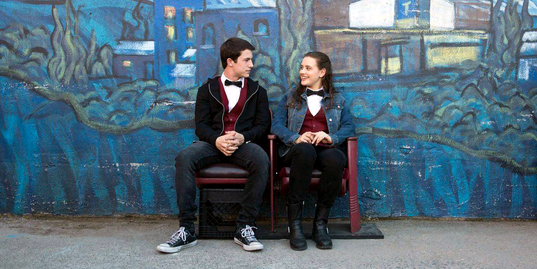
The Criticism of 13 Reasons Why

"Why didn't you say this to me when I was alive?"
When I was younger there was one thing that always bugged me about television shows. It seemed like every show had to go out of its way to preach some kind of a positive message. I found this to be especially intrusive in sitcoms. There was always that one moment near the end of the episode, when the laughing stopped, so the characters could share an emotional learning moment. It did not take me very long to realize that somebody decided that television had to be there to teach life lessons to the viewers. I thought that this was distracting and completely unnecessary. If I want to watch a show, I want to be entertained and not have to get lectured at on the positive message of the week. At that young age, I also knew that television shows had to do this routine out of some sort of pressure. After all, everybody has heard of all the times that television was accused of being a negative influence on its viewers.
As I grew older, I started to come across television shows that did not go out of their way to teach life lessons. I was finally able to just sit back and watch a show without getting preached at. As the years went by, television shows took more risks, became unapologetic, and we got to see characters that were far from moral. Because of this, we started to get storylines that could never be told as long as the show had to teach a positive message. The television industry had indeed changed, but it was not without any criticism.
There are some people who complain that television teaches people to do bad things. There is some truth behind this point. We have all heard of the studies that concluded that children became aggressive after watching violent shows. It also seems like every few months, there is yet another real life chemistry teacher that got arrested for getting into the crystal meth business. Granted, these people got the idea from watching a show or a movie, but the question that needs to be asked is just who is truly responsible?
With the release of the 13 Reasons Why streaming series, once again many people are expecting a show to be responsible for how the audience reacts to the show. 13 Reasons Why received a lot of negative criticism, not for its quality, but for not going out of its way to teach its audience a lesson. People said that the show glorified suicide and that the show did not do enough to teach the viewers how to get help. So now, many are fearmongering, claiming that 13 Reasons Why makes it seem like suicide is an acceptable option. The overreaction has gotten to the point where some school libraries are banning the original novel that the show is based on.
In response, I have this one question: Why should 13 Reasons Why be obliged to educate its viewers?
Here is the thing: 13 Reasons Why is not a show that appears on television. It is not possible to just channel surf and to unintentionally come across the show. 13 Reasons Why is available only on Netflix. It means the only way you can legally watch it is by having gone out of your way to have obtained a Netflix account. Netflix is also quite clear in its rating system that the show is meant for a mature audience. The show may revolve around teenagers, but the show is definitely not intended to be watched by minors. So if 13 Reasons Why somehow got watched by minors, it is definitely not the responsibility of the show or its distribution method. If kids watched it, then it is the responsibility of the person who paid for the Netflix account. But these many safeguards to watching the show were somehow not enough to stop younger viewers from watching 13 Reasons Why. Because of this, we now have a bunch of people complaining about 13 Reasons Why negatively impacting its viewers.
The other major criticism of 13 Reasons Why is that the show was too emotionally triggering to watch. But just what validity does this criticism hold? We all knew what was going to happen in the finale. It was made abundantly clear at the beginning and in the trailer. If that was not enough, Netflix even has a description of the show. "After a teenage girl's perplexing suicide, a classmate receives a series of tapes that unravel the mystery of her tragic choice." Considering all this, we all had to anticipate that Hannah was going to go through hell before she took her own life. Now given this premise, why did some people still continue to watch it, knowing how tragic the storyline was destined to be? More importantly, is it really fair to blame the show for how viewers felt about it? As a part of the criticism, the complainers want shows to go back to the good old days of being safer to watch, and not without a positive message.
I have a much different opinion.
If you do not feel comfortable with a show, then do not watch it, especially when you were given plenty of warnings about it. It is as simple as that. If you feel like acting on a bad idea that you got from watching a show, then you should go and get professional help. If you have kids, then you should not let them watch anything with a mature rating. This should be easy to do, considering that Netflix has parental controls built into it. Now does any of this sound at all unreasonable? Instead, people decided to complain. It is too bad that Netflix got pressured into putting advisory warnings at the beginning of some of the episodes. This in turn, ended up giving away the storyline for these episodes.
If you are an adult that got traumatized, that is your responsibility. If you let your kids get traumatized, that is your responsibility. Stop blaming the show. Stop demanding that more needs to be done to protect the viewers. Stop saying that "Beyond the Reasons" was not enough. You do not need to go to war with the show. Have any of you ever taken a look at the 13 Reasons Why Wikipedia entry? The rantings about the show are long and tedious. Worst of all, it also gives an indication of just how in this day and age, people still use entertainment as a substitute parent. When entertainment does not do the job of a parent, it becomes a scapegoat. And why should a show be obligated to make time to deliver a lesson or to tell the viewers where to find mental health resources? In our modern age, anybody can get help and information by searching the internet.
Unlike the many complainers, I actually enjoyed watching the show very much. I felt that the show did a lot of things right. Most importantly, 13 Reasons Why gave us an idea of the huge disconnect there is between the worlds of adults and teens. This is an accurate depiction of reality. Either the adults are oblivious or they are incapable of communicating with teens, and the people that are paid to care, are often useless or harmful. Because of this, the teens that need help the most are not provided the help that they need. This only makes these teens feel more isolated. 13 Reasons Why is great at driving this important point home. The show understands that teenagers are not yet capable of expressing their needs, and that the system and the parents should be more engaged. It is unfortunate that the people that complain about the show, have completely missed this point.
On the positive side, the criticism of the show has given much-needed attention to issues that need to be talked about. So in a way, the unfair criticism of the show is doing the job of making people more aware of social problems. In typical fashion, when something gets negative publicity, it only becomes more popular. This in turn gets more viewers thinking and talking about the harsh realities of growing up. Because of 13 Reasons Why, it has become more acceptable to talk openly about the difficulties that teenagers face.
To tie this back to the earlier point on delivering a positive message, it really comes down to competent adult involvment. There comes a time when adults need to be more in tune with what is happening in the world of teenagers. If an issue does not get proper attention, then the consequences could be irreversible. In a lot of ways, this is the message that was sent out by 13 Reasons Why. Since the message came in the form of a consequence and not as some sort of a happy resolution, people got mad at the show. The fact that people need to react to a show this way, only goes to prove that parents are not being responsible in how they raise their children.
If, god forbid, somebody does take their own life after watching 13 Reasons Why, then it is because much more went wrong that has nothing to do with the show. With luck, 13 Reasons Why is a wake up call for everybody to acknowledge all the things that are wrong. Maybe it is because of this reason, that people are reacting the way they are to the show. It is just so much easier to get mad at entertainment than it is to care about real life. If you still feel the need to criticize 13 Reasons Why for not spelling out a positive message, then maybe you should refocus yourself by addressing some real life problems. If you require help on this one, then you can start by listening to the voices that need to be heard the most.
Tags: 13 Reasons Why, Katherine Langford, Dylan Minnette, Christian Navarro, Alisha Boe, Brandon Flynn, Justin Prentice, Miles Heizer, Selena Gomez, Jay Asher


SBM on Social Media